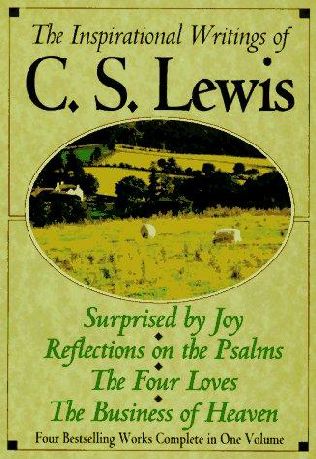 Lewis' Reflections on the Psalms is perhaps best described as a menagerie of commentary, loosely organized, full of delightful rabbit trails. (One gets the sense, in reading this work, that Lewis is not above using a subject as a platform for what he really wants to say.) It is with difficulty that I refrain from quoting paragraph after lovely paragraph.
Lewis' Reflections on the Psalms is perhaps best described as a menagerie of commentary, loosely organized, full of delightful rabbit trails. (One gets the sense, in reading this work, that Lewis is not above using a subject as a platform for what he really wants to say.) It is with difficulty that I refrain from quoting paragraph after lovely paragraph. Portraying the Psalms as Jewish rather than Christian, Lewis derives some fascinating observations from this distinction. Some may feel he has taken this matter of context too far. It is possible. But appeals to context may take many forms, and I am afraid we are more accustomed to the dishonest ones.
We start out talking about Judgement and Cursings, abiding by the "best-for-last" maxim: "I begin with those characteristics of the Psalter which are at first most repellent. Other men of my age will know why. Our generation was brought up to eat everything on the plate; and it was the sound principle of nursery gastronomy to polish off the nasty things first and leave the tidbits to the end." And here the disparity between the Judeo and Christian worldview is immediately apparent. For while the Christian properly considers himself wrong and asks mainly for mercy, (defendant position,) the Psalmist considered himself wronged, hence his incessant pleas for "judgement," and "justice" (plaintiff position).
Continuing on into the subject of Death, Lewis makes some very interesting comments about Heaven and Hell. I hope to soon explore this topic in some depth; if you want to anticipate the discussion, you can read the relevant excerpt here.
The subsequent chapters take a brighter turn. My suspicion is that we too often divorce our appreciation for God from our appreciation for other things, and Lewis addresses this by pointing out the simple, coherent cultural backdrop of the Psalms. "He was a peasant, very close to the soil. He had never heard of music, or festivity, or agriculture as things separate from religion, nor of religion as something separate from them. Life was one. ... There, despite the presence of elements we should now find it hard to regard as religious at all, and the absence of elements which some might think essential to religion, I find an experience fully God-centred, asking of God no gift more urgently than His presence, the gift of Himself, joyous to the highest degree, and unmistakably real." Our modern ideas concerning what is truly "spiritual" are likely in need of redefinition; we may have, in some areas, bought into what A.W. Tozer calls the "sacred-secular antithesis."
I found his comments on Praise particularly exhilarating; I'll let that hang as a teaser.
Several passages proved rather convicting, notably a paragraph on quarrelling and another on criticism. Lewis is too perceptive to restrict everything to fun and games, at the same time possessing the singular ability to pen rebukes that drip with gentleness.
Some may find his comments on Scripture somewhat irreverrent, or at least distasteful. But few would not be won over as Lewis allows, with sparkling humility, that "What we see when we think we are looking into the depths of Scripture may sometimes be only the reflection of our own silly faces."












No comments:
Post a Comment